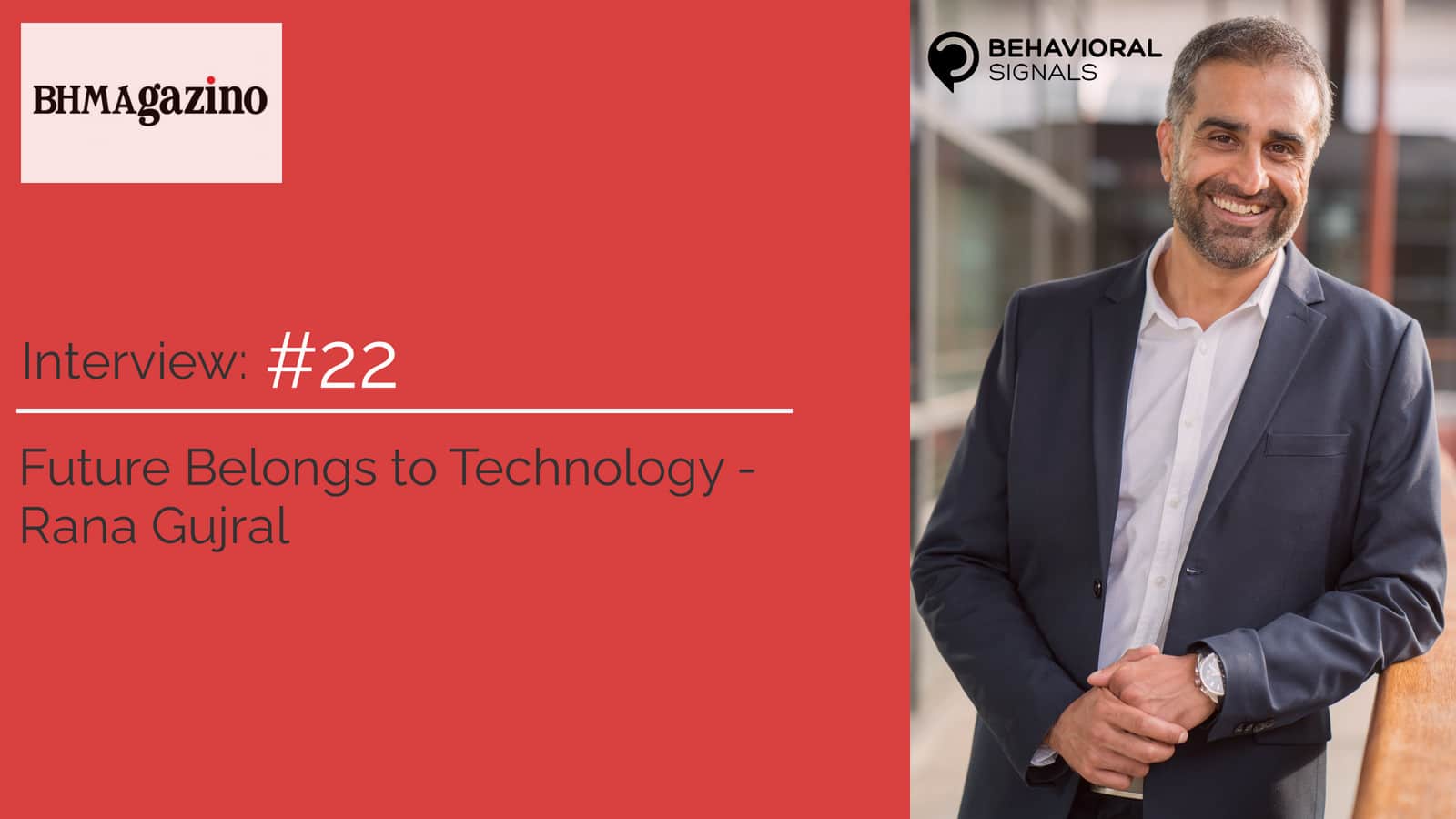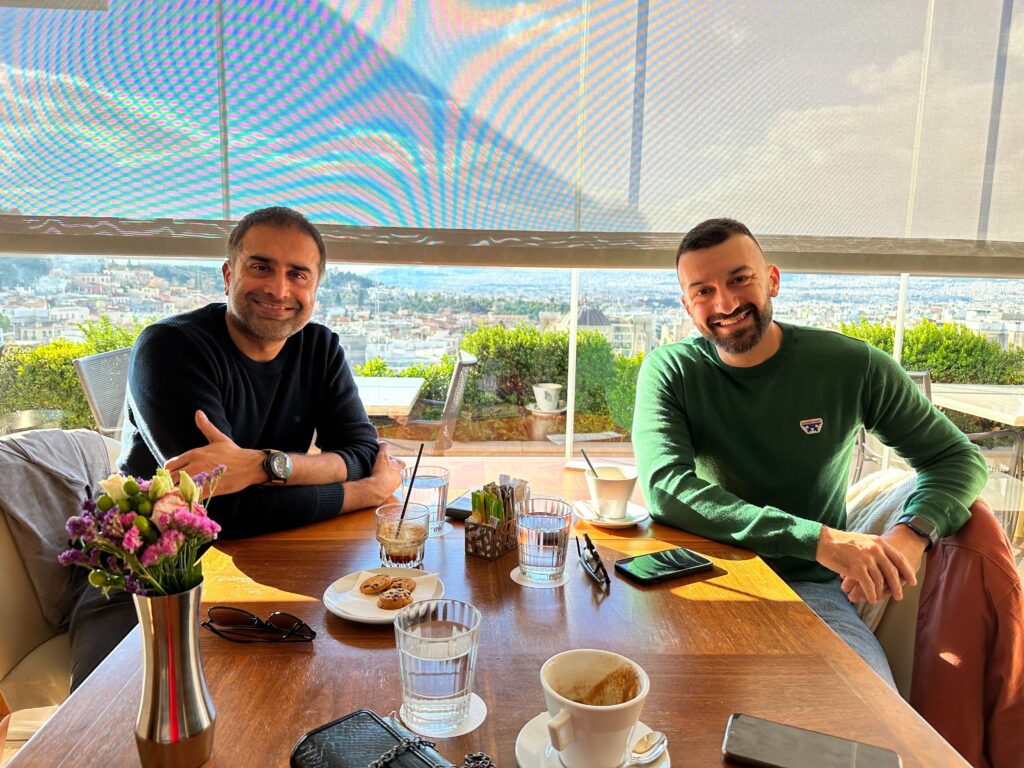
Interview: The Future Belongs to Technology – Rana Gujral
The entrepreneur and CEO at Behavioral Signals, Rana Gujral, talked to BIMAgazino, a well-known Greek Medium, about the role of technology, AI, and emotion in artificial intelligence applications.
Interview by George Nastos, VIMAgazino
A charming speaker and a successful entrepreneur Rana Gujral has carved an impressive career in the tech industry. In his recent position, he’s the CEO at Behavioral Signals, a company bridging the communication gap between humans and machines by introducing emotional intelligence from speech into conversations with AI. The company has created the fastest evolving and most robust emotion AI, enabling everyone to add emotion and behavior recognition to their own software solutions. VIMAgazino recently met him in Athens and discussed the opportunities and challenges of a digital world.


Mr. Gujral, talk to us a bit about yourself
I grew up in India and then moved out right after my undergrad. I have traveled all around the globe since my early career. For the most part, my career has been in technology and software and in building technology products. I’ve worked with companies like Kronos – which built time clocks and software systems. It was so successful that it became the largest-selling time clock in the sense of punching device in the world and brought in almost a billion and a half dollars of revenue over a few years. Then, at Logitech, I worked on building a lot of smart home products – digital home automation products. I also had an exciting opportunity to turn a bankrupt company around, which was a fantastic experience because the company had been in the business for over 25 years at that time. The company had shrunk from its peak of about half a billion in sales at the time – it was about 25-30 million and was losing $100 million every year. And it was a big challenge to see if we could save it. When we looked at it, we realized that the only way we could do that is by coming up with an experience on the product that the market hadn’t seen before, like completely redesigning the product. And, long story short, we did it. And it just started selling like hotcakes.
I assume you like challenges. What was next?
Yes, I find it very interesting to do something that I have never done before. For me, there always comes a moment – when everything is comfortable, easy, and stable – when I feel that it is worth taking on something new that involves risk but could reward in many ways. So, after that, I was looking for my next challenge, and I was like, ok, my next challenge would be to do a company from scratch, from ground zero. I had an idea of building a software product for a very specialized vertical and decided to go and build it. It was in the early days of machine learning and AI. So, I founded Tize in the bay area Silicon Valley and built a product that could predict the price of a commodity three months in the future. So it was almost like a crystal ball. Tize eventually got acquired in 2.5 years, and after that, I came across behavioral signals, which is the current company that I’m at.
Tell us more about Behavioral Signals. What does the company do?
Professors and Scientists Alexandros Potamianos and Shri Narayanan founded Behavioral Signals in 2016, driven by a passion to bring their ground-breaking patented speech-to-emotion and speech-to-behaviors technologies to market. Technology is at the core of what we do. Our solution uses a person’s speech and tone of voice to recognize emotions and predict their behavior, introducing the factor of emotional intelligence (Emotion AI) into conversations with artificial intelligence. What does that mean? Emotions and behaviors are expressed in many different ways. It’s our facial expression, it’s our body language, it’s what we’re saying, the words, and also the “how” we’re saying the words, using different variations of tones. We have created the fastest evolving and most robust emotion AI, enabling everyone to add emotion and behavioral recognition to their own software solutions through the Oliver API. AI-Mediated Conversations (AIMC), one of our two flagship products, can create the perfect match between a customer and an agent in a call center, for example, who can best handle his needs. This matching is created using algorithms developed after years of research. The technology can be used in sales calls, revenue recovery calls, or any other conversation where customer satisfaction and engagement are paramount.
Can you describe the process of behavioral matching?
At the raw level, the technology is essentially extracting intelligence and signals from the tone of voice, which is how something is being said. Now roughly what we’re extracting can be put in three different buckets. One is a bucket of emotional signals like anger, happiness, sadness, etc. Then there is a bucket of behavioral signals like engagement, empathy, and politeness. And there’s a third bucket which is a very interesting list that contains advanced classifiers – classifiers is a technical term in machine learning where you’re building some macro level insights and assessments, for example, identifying if someone is stressed or identifying if someone else is in duress, some you know, controlled situation. And also predicting intent, like, for example, predicting if a person will pay or not pay its debt holder or if a client will buy or not buy. These are some of the things we have chosen to focus on, but this technology can build a dozen of products out there, for example, on the healthcare side.
Can you share a Case Study?
Of course! One of the first implementations we did was with a big EU bank. The solution was deployed on Live Data in a champion/challenger setup, demonstrating a significant return on investment with an actual increase of active revenue recovery/restructuring applications by 20.1% in total. On top of that, this improvement was essentially achieved with 7.6% fewer calls (Right Party Contacts), leading to additional cost reductions. In absolute numbers, these results actually correspond to approximately $7.5M USD of additional restructured debt for the Bank over the course of this evaluation and a potential $300M USD annual upside. We are primarily focused on the customer experience, and many of our clients are in the financial sector. We partner with large solutions integrators and systems integrators like GenPact and dDCom out of Latin America. Apart from the financial industry, this is a solution any call center can use to help with the outcomes and provide a more human and empathetic way to have a conversation. So, if you’re going to have a debt collection conversation, you’ll have a debt collection conversation. You cannot avoid it. But if you can talk to someone you have a better rapport with, you will feel better about it, and the agent, on the other hand, will handle it better. So, both win.
Can you explain how Behavioral Signals is related to Greece?
One of our founders, Alexandros Potamianos, is Greek. He’s an Associate Professor at the School of Electrical and Computer Engineering at the National Technical University of Athens. Our headquarters are located in Los Angeles, CA. Still, we decided to keep our team of researchers and developers in Athens, as Greece has a strong research culture and many highly skilled professionals. We also collaborate with several research institutions, like Athena and Demokritos. In a way, we are far more of a Greek company as we have more employees here than in America. And we do not plan to change that!
In recent years, there have been raised several objections on the future use of AI. Is there anything that makes you worried when it comes to AI?
Yes. I’m worried about AI having its own consciousness and being beyond human control. This is uncharted territory; we don’t know. Do I feel will get there? 100%. There is debate in the scientific community about when this particular technology will be ready, but I believe that this will happen during my life, completely change the human experience and deeply affect society. Many people will lose their jobs. Yes, the technology eliminates some of them and creates others. I understand not everyone can adapt to change, become a programmer, and write code from one day to another. So, I fear there will be social unrest until some balance is achieved. I want to raise one more concern. One of the most effective implementations of AI today is on the military side. And that’s scary in many ways: robust weapon systems that humans will not operate. In any case, we can’t stop tech development, the train is already on the tracks, but maybe we can catch up and build a protective framework, thus mitigating some adverse effects.
What do you think about the fact that the crosses of Silicon Valley are considered to be celebrities?
A decade ago, the billionaire Marc Andreessen uttered a proven prophetic phrase: “Software is eating the world.” Τechnology and its developments drive the world. So it’s not surprising that tech moguls are the world’s most famous and wealthiest people.
Do you admire any of those fascinating tech guys? Jeff Bezos or Elon Musk, for example?
Many of these personalities are considered controversial, but we can’t ignore many of their achievements. Elon Musk, whom you mentioned, despite his often problematic behavior, is someone who, even with his grand plans, is pushing the boundaries of humanity, and it is impossible not to recognize the successes of SpaceX or even the revolution he brought to the field of electric mobility. He has a vision – often in a manic fashion. Steve Jobs did the same and achieved a lot. I do admire people in the scientific community that is also pushing the boundaries in areas of new research. One of them is Joshua Bach, one of the greatest minds involved in the field of cognitive artificial intelligence. I would also like to mention Ben Goertzel, who has done amazing work in the field of robotics designing Sophia the robot, as well as Dr. Kai-Fu Lee from Taiwan, an outstanding computer scientist and venture capitalist who manages one of the world’s most significant AI-related funds. I am pleased to have all three of them on the Behavioral Signals Scientific Board.
What do you think of Chat GPT?
Chat GPT is one of the many things that are really changing the conversation around us. On one side, you can explain it as a very simple language model; we know how it works, and we know what it does. It’s essentially a very smart implementation of taking all of the data on the internet and coming up with intelligence around how to process that language and description around it. On the other hand, what it can achieve, it’s just mind-boggling. We used it a few days ago as a team when we faced a serious problem; we described it as expressing some very complex questions. The answers were shockingly apt. So much that there was silence in the room…and we were just scratching the surface. GPT is built on the older GPT3 implementation, the GPT4, which will come out soon, is considered to be 100 X better. And so then there’ll be a chat GPT version of GPT4. And then there are others coming out. Sparrow coming out of google’s deep mind, and there are a few other chat GPT implementations that are being built in the vacuum. There’s some amazing technology that is being put together.
The future belongs to India. What is your opinion?
I think India has a lot of potential, but it remains to be seen whether it will fulfill it. The country needs to solve some structural issues first. Most states, in the West at least, follow a certain path to development. They are moving from an agricultural to an industrial economy and then to services. India has moved from agriculture to services; it has a very sophisticated technology sector and medical sector and even operates in Space, owning one of the few state-owned companies that build satellites for commercial use. But it still lacks basic infrastructure: roads, airports, clean water, and housing. Unless this is solved first, it will hardly become a true global superpower, though it is in a demographically favorable position compared to China, whose population is declining.
…it also has a very well-educated workforce
Yes. India has a very advanced education sector. Its Educational institutes are world-class, and that’s a good point. I believe any country that wants to have any influence should take technology seriously; otherwise, it will be irrelevant in the future. The powerful, wealthy countries in the Middle East have realized that and are investing heavily in technology development. Europe, in general, and Greece, in particular, should not ignore this. Strong and enlightened leaderships are needed to establish the relevant framework and create technological ecosystems; otherwise, the situation will be challenging 30-40 years from now.


